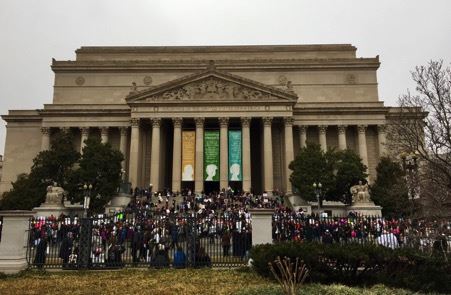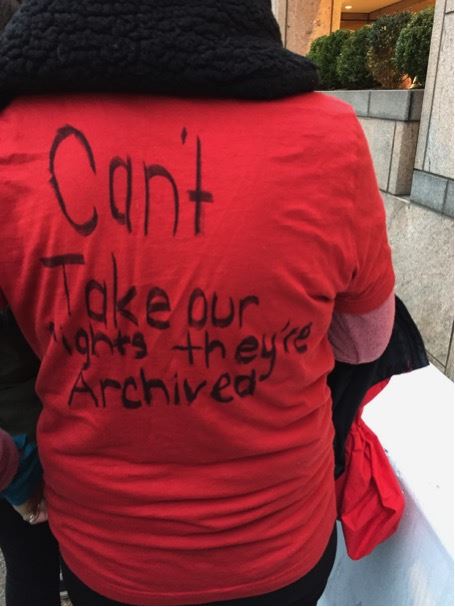On February 13, 2017, New England Archivists issued an official statement opposing political actions that discriminate against individuals and calling for a more transparent government and documentation of all government activities, regardless of political party. NEA stands ready to work with others to ensure that federal policies and funding recognize and support archives as an essential element of an enduring democracy.
NEA Official Statement
Actions of a government that impact access to information, discriminate against specific groups, and reduce government transparency are a threat to the core values of New England Archivists (NEA). We urge the new administration to pursue policies that promote access to information, protect against discrimination, and maintain transparency and funding for federal offices and programs that support preservation of our national heritage. Our statement is based on our understanding that the archive is essential to democracy. New England Archivists is a volunteer-run organization of professional archivists and records managers who live or work in the states of Connecticut, Maine, Massachusetts, New Hampshire, Rhode Island, Vermont, and beyond.
NEA IS COMMITTED TO:
- Visibility and advancement of archival practice and of all individuals engaged in archival work and study.
- Community building with an emphasis on diversity and inclusion.
- Encouraging collaboration, innovation, experimentation, and creativity across institutions and areas of expertise.
- Stewardship of history and the historical record.
- Transparency, integrity, and professional ethics.
Access to information and intellectual freedom are threatened when a budget blueprint advocates for the elimination of the National Endowment for the Humanities and the National Endowment for the Arts, and the cessation of federal funding for the Corporation for Public Broadcasting, proposals we believe violate fundamental democratic values. Archivists democratize access to information by physically preserving, organizing, and describing historical materials so they can be found and used by all. When we are able to digitize historical materials and make them available online, we make they even more broadly accessible. Even with public funding through national endowments, archival repositories struggle to meet the demands from the public whom we serve. Elimination of funding and programs for arts, humanities, and broadcasting programs will challenge archival programs, scholarship, and the American public’s access to its own cultural heritage. Without the work of archivists, history is at risk of being lost, and collections that are saved would be accessible only to those wealthy enough to travel—if they are able to be saved at all.
Many Americans who might otherwise never have the time or ability to do their own research in an archives can benefit from the work of others, thanks to, for example, the support for broadcasting provided by the Corporation for Public Broadcasting (CPB). Without federal funding, Ken Burns’s acclaimed and popular documentaries including “The Roosevelts,” “Jackie Robinson,” “The National Parks,” “Jazz,” and “The Civil War” would not have been made. If our government does not support the stewardship of history, it will be cutting off access to the nation’s bounteous cultural heritage, and our citizens will be much poorer for it.
Discrimination against individuals restricts their access to archival resources, and as such diminishes scholarship and freedom. New England Archivists is committed to a diverse and inclusive community, and we join the Society of American Archivists in strongly opposing the discriminatory executive order issued by the Trump Administration on Friday, January 27, 2017, barring entry to the United States by individuals from seven Muslim-majority countries (Iran, Iraq, Libya, Somalia, Sudan, Syria, and Yemen). We oppose actions that discriminate against individuals and threaten individual rights. When groups are barred from entering the United States based on their religious or regional identity and their access to archival resources is denied, then both the pursuit of scholarship and the democratic access to information are threatened.
In addition to federal funding, stewardship of the historical record requires a transparent government and documentation of all government activities, regardless of political party. Responsible stewardship is not possible when publicly-funded research is buried, when federal agencies are ordered to stop sharing information, and when federal officials use personal and government Twitter accounts interchangeably. Democracy depends upon retention of, preservation of, and access to federal records. We urge the administration to adhere to archival principles and practices in documenting the work of the United States government.
NEW ENGLAND ARCHIVISTS STANDS READY TO WORK WITH OTHERS TO ENSURE THAT FEDERAL POLICIES AND FUNDING RECOGNIZE AND SUPPORT ARCHIVES AS AN ESSENTIAL ELEMENT OF AN ENDURING DEMOCRACY.
New England Archivists Executive Board
February 13, 2017

WORK CITED
The Heritage Foundation. (2016). A Blueprint for Balance: A Federal Budget for 2017. Washington, DC.: The Heritage Foundation. Retrieved from http://thf-reports.s3.amazonaws.com/2016/BlueprintforBalance.pdf
Society of American Archivists. (2017) SAA Statement on Executive Order Restricting Entry into the United States by Individuals from Seven Muslim-Majority Countries [Press Release] Retrieved from http://archivists.org/ saa-statement-on-executive-order-restricting-entry-into-the-united-states-by-individuals-from-seven


Women’s March on Washington protestors taking a break on the steps of the National Archives and Records Administration, Washington, DC., Saturday, January, 21, 2017. (Photograph by Jennifer Gunter King, President of NEA 2016-2017)

“Can’t Take Our Rights — They’re Archived” T-Shirt photographed at Metro Center during the Women’s March on Washington, Washington, DC., Saturday, January, 21, 2017. (Photograph by Jennifer Gunter King, President of NEA 2016-2017)
